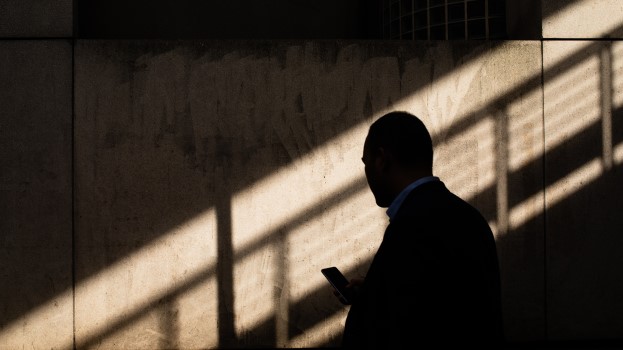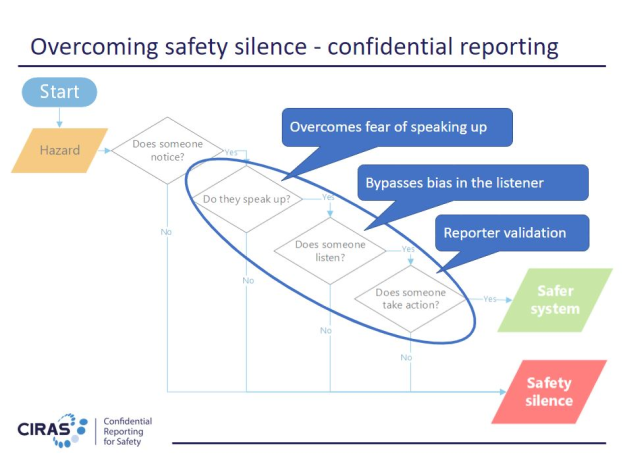CIRAS works because we always protect reporter identity.

When people want to share a suggestion or concern but are not confident of a positive response – perhaps because of earlier experiences – it can be a challenge for them to open up.
In the context of health, safety and wellbeing, most businesses want access to all the information they can get, no matter how challenging. They can only begin to address hazards and improvement opportunities with this knowledge, as part of an effective, open safety culture.
Most businesses are geared towards discovering this vital intelligence, especially in operational industries where it could prevent a serious accident or operational breakdown. But looking beyond typical information sources can be revealing. Confidentiality may be the only way to facilitate this.
Confidential reporting
CIRAS is a not-for-profit confidential reporting service offering people working in transport and infrastructure a way to let their employer know about health, safety or wellbeing issues without revealing their identity. The service is available to all employees of 1,900 member companies.
CIRAS has never breached confidentiality in 25 years and thousands of contacts. We will never release any details that could identify someone reporting a concern, to anyone.
Our analysts remove all identifying information and carry out a risk assessment on confidentiality every time anyone contacts us to report a concern. The analysts communicate between the company mentioned in the concern and the person raising it. They obtain the company response and share it with the reporter to close the loop with feedback.
Confidentiality is not the same as anonymity. In ‘anonymous reporting’, no one knows who reported the hazard or incident. With confidential reporting, the details of the person raising a concern are known but restricted: in our case, only CIRAS analysts know them.
The benefit of this is that reporters receive feedback. The company can ask for more information about the concern if needed – CIRAS will go back to the reporter on their behalf – and the person who reported the concern can provide feedback to the company about its response, via CIRAS.
Confidential reporting is different from whistleblowing too. Whistleblowing presumes wrongdoing and exposes illegal, unethical or otherwise wrong actions. In contrast, confidential reporting focuses on safety improvement. The big difference for staff is that those who report confidentially have their identity protected, guaranteed – and those who receive reports have a chance to improve practice in a non-judgmental environment.
Why confidentiality?
Confidential reporting:
- encourages people to come forward
- overcomes barriers to people reporting
- sends the right message to your staff and improves morale
- demonstrates safety leadership to the wider industry
- leads to better safety intelligence, which can reduce risk, avoid costs associated with incidents and improve performance.

Above: How confidential reporting overcomes safety silence
Our data – from our analysts’ interviews with those raising concerns – shows the need for an independent, confidential reporting option: a fifth of those who contacted CIRAS in the 2021/22 financial year without first trying internal channels did so because they feared retribution if they reported internally. That’s whether they had cause to fear it or not.
This is backed up by research showing that implementing a confidential reporting system leads to greater willingness to report. Even in an open safety culture, not everyone feels comfortable speaking up, but having a range of different reporting options is the key.
Safety intelligence from confidential reporting complements data from traditional channels. Report data can be aggregated, with identities protected, to show trends across sectors and industries. Lessons learned from CIRAS reports can lead to, for example, changes to rules and procedures – and these learnings are shared with members.
The importance of this learning is highlighted in the incident reporting and analysis feedback loop by Dr Charles Billings, one of the founders of the confidential Aviation Safety Reporting System (ASRS). Since launching more than 40 years ago, NASA’s ASRS has become the biggest repository of aviation human factors incidents in the world. This is testament to its confidentiality and independence – NASA has no regulatory or enforcement role – a situation shared by CIRAS.
Ultimately, confidential reporting means that everyone feels able to speak out for safety, whoever they are and however their experiences have shaped them. What they know could help to prevent an accident, so it’s important to make it as easy as possible for them to raise their voice – and then listen.
Find out more
Contact enquiries@ciras.org.uk.
Tags
- Confidential reporting
